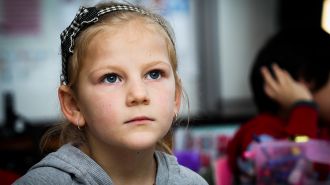- Our studies
- Our research
- Publications and resources
- Data access and training
- About
- News
- Events
- Get in touch
- Join our mailing list
Welcome to our news and blogs section. Here you’ll find the latest developments and insights from across our longitudinal studies.
Growing Up in Digital Europe (GUIDE) is the UK pilot of a major European initiative to create internationally harmonised data for research on child development and wellbeing.

People who exercise regularly are more likely to be satisfied with their lives, according to a new study.

Substantial numbers of baby boomers, especially lower and middle earners, are expecting to work past state pension age.

Young adults who are employed on zero-hours contracts are less likely to be in good health, and are at higher risk of poor mental health than workers with stable jobs.

Psychological problems are on the rise for young adults, with greater numbers reporting poor mental health in their mid-twenties than during adolescence.

Now that the participants have turned 25, this new data will allow researchers to explore how their educational choices, family resources and experiences in adolescence have influenced their life chances so far. The data includes extensive information about cohort members’ lives at this pivotal time.

Up to 1 in 5 children in the poorest fifth of families display symptoms of mental illness, compared to 1 in 20 children from the richest homes. But according to a new study, mothers’ mental health matters even more.

Support for children with emotional and behavioural problems may be more effective if targeted at those with both cognitive difficulties and depressed mothers, new findings suggest.

Children who experience physical or sexual abuse have three times the odds of having suicidal thoughts at age 45, new research shows.

Twenty-somethings who pursued vocational training rather than university report being just as satisfied with their lives, according to new research
Held at the University of Manchester, this workshop gave both first-time and more experienced data users an insight into four of the UK’s internationally-renowned cohort studies run by the Centre for Longitudinal Studies (CLS).

How has the Millennium Cohort Study (MCS) aided government understanding of the social inequalities faced by young people today?

Using data from the Millennium Cohort Study (MCS) and Next Steps, this research project investigates the role of aspirations on social reproduction and social mobility across the divides of gender, ethnicity, disability and social class.
Ryan Bradshaw
Senior Communications Officer
Phone: 020 7612 6516
Email: r.bradshaw@ucl.ac.uk